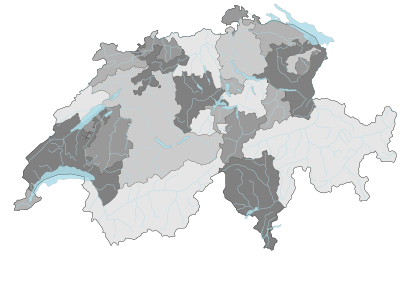Cantonal
| Swiss cantons Schweizer Kantone (German) Cantons suisses (French) Cantoni Svizzeri (Italian) Chantun svizra (Romansh) |
|
|---|---|
Also known as:
|
|
| Category | Federated state |
| Location | Swiss Confederation |
| Found in | Country |
| Created | 16th century |
| Number | 26 cantons (as of 1979) |
| Populations | 15,778 (Canton of Appenzell Innerrhoden) – 1,421,895 (Canton of Zürich) |
| Areas | 36 km2 (14 sq mi) (Canton of Basel-Stadt) – 7,105.5 km2 (2,743.43 sq mi) (Canton of Graubünden) |
| Government | List of cantonal executives of Switzerland |
| Subdivisions | Districts and communes |
The 26 cantons of Switzerland (German: Kanton, French: canton, Italian: cantone, Romansh: chantun) are the member states of the Swiss Confederation. The nucleus of the Swiss Confederacy in the form of the first three confederate allies used to be referred to as the Waldstätte. Two further major steps in the development of the Swiss cantonal system are referred to by the terms Acht Alten Orte ("confederation of eight"; between 1353 and 1481) and Dreizehn Alten Orte ("Thirteen-Canton Confederation", during 1513–1798); they were important intermediate periods of the Ancient Swiss Confederacy.
Each canton (or in earlier times: Statt ("site/settlement"), or Städte und Länder ("towns and countries/countrysides"), or Ort (lit.: place, referring to "sovereign territory", "community"), or Stand ("estate") from the 13th century to around 1800) was a fully sovereign state with its own border controls, army, and currency from the Treaty of Westphalia (1648) until the establishment of the Swiss federal state in 1848; with a brief period of centralized government during the Helvetic Republic (1798–1803). With the Napoleonic period of the Helvetic Republic the term canton/cantone/Kanton was fully established. From 1833, there were 25 cantons, increasing to 26 after the secession of the canton of Jura from Bern in 1979.
The term , now also used as English term for administrative subdivisions of other countries, originates in French usage in the late 15th century, from a word for "edge, corner" (recorded in Fribourg in 1475). After 1490, canton was increasingly used in French and Italian documents to refer to the members of the Swiss Confederacy.
...
Wikipedia

